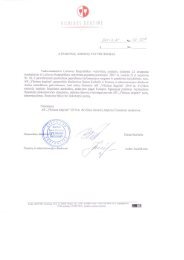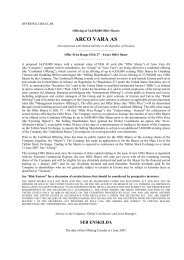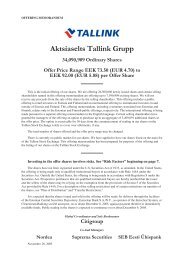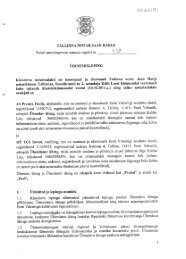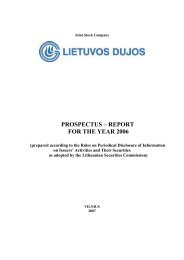AB „SNAIGĖ“ - NASDAQ OMX Baltic
AB „SNAIGĖ“ - NASDAQ OMX Baltic
AB „SNAIGĖ“ - NASDAQ OMX Baltic
You also want an ePaper? Increase the reach of your titles
YUMPU automatically turns print PDFs into web optimized ePapers that Google loves.
Consolidated annual report for year 2008<br />
PRINCIPLES/ RECOMMENDATIONS<br />
4.7. Activities of the collegial body should be organized<br />
in a manner that independent members of the collegial<br />
body could have major influence in relevant areas where<br />
chances of occurrence of conflicts of interest are very<br />
high. Such areas to be considered as highly relevant are<br />
issues of nomination of company’s directors,<br />
determination of directors’ remuneration and control<br />
and assessment of company’s audit. Therefore when the<br />
mentioned issues are attributable to the competence of<br />
the collegial body, it is recommended that the collegial<br />
body should establish nomination, remuneration, and<br />
audit committees. Companies should ensure that the<br />
functions attributable to the nomination, remuneration,<br />
and audit committees are carried out. However they may<br />
decide to merge these functions and set up less than<br />
three committees. In such case a company should explain<br />
in detail reasons behind the selection of alternative<br />
approach and how the selected approach complies with<br />
the objectives set forth for the three different<br />
committees. Should the collegial body of the company<br />
comprise small number of members, the functions<br />
assigned to the three committees may be performed by<br />
the collegial body itself, provided that it meets<br />
composition requirements advocated for the committees<br />
and that adequate information is provided in this<br />
respect. In such case provisions of this Code relating to<br />
the committees of the collegial body (in particular with<br />
respect to their role, operation, and transparency)<br />
should apply, where relevant, to the collegial body as a<br />
whole.<br />
4.8. The key objective of the committees is to increase<br />
efficiency of the activities of the collegial body by<br />
ensuring that decisions are based on due consideration,<br />
and to help organize its work with a view to ensuring<br />
that the decisions it takes are free of material conflicts of<br />
interest. Committees should present the collegial body<br />
with recommendations concerning the decisions of the<br />
collegial body. Nevertheless the final decision shall be<br />
adopted by the collegial body. The recommendation on<br />
creation of committees is not intended, in principle, to<br />
constrict the competence of the collegial body or to<br />
remove the matters considered from the purview of the<br />
collegial body itself, which remains fully responsible for<br />
the decisions taken in its field of competence.<br />
4.9. Committees established by the collegial body should<br />
normally be composed of at least three members. In<br />
companies with small number of members of the<br />
collegial body, they could exceptionally be composed of<br />
two members. Majority of the members of each<br />
committee should be constituted from independent<br />
members of the collegial body. In cases when the<br />
company chooses not to set up a supervisory board,<br />
remuneration and audit committees should be entirely<br />
comprised of non-executive directors. Chairmanship and<br />
membership of the committees should be decided with<br />
due regard to the need to ensure that committee<br />
YES/NO<br />
/NOT<br />
APPLIC<strong>AB</strong>LE<br />
COMMENTARY<br />
NO The committees of the appointment of the directors of the<br />
Company, the remuneration and audit committees have<br />
not been formed given a very small number of the<br />
Members of the Board, and absence of such practice and<br />
requirements in the past. The functions specified in this<br />
item are performed by the Board within the limits of its<br />
competence.<br />
In the event the shareholders pass a decision to increase<br />
the number of Members of the Board by new independent<br />
members, the Company will be able to set up the<br />
committees in question.<br />
NO These provisions are not followed as the committees have not<br />
been set up. However, after audit committee set up in 2009,<br />
provisions will be followed.<br />
NO The committees have not been set up. Audit committee will be<br />
set up in year 2009 by general meeting of shareholders.<br />
Prepared by U<strong>AB</strong> FMĮ „Orion Securities“ p. 47





